Moving to South Africa – A Complete Emigrating Guide

Thinking about relocating to South Africa? You are not alone.
Over 212,000 British expats have already made the move, drawn in by the country’s breathtaking landscapes, vibrant culture, and affordable cost of living.
South Africa is a land of contrasts, where golden beaches meet rugged mountains, and bustling urban centres coexist with expansive nature reserves.
With a warm climate, incredible wildlife, and much lower cost of living compared to the UK, it is no surprise that more people are considering South Africa as their new home.
English is one of the country’s 11 official languages, making daily life easier for British expats.
However, immersing yourself in South Africa’s multicultural society will introduce you to a rich tapestry of languages, including Zulu, Afrikaans, and Xhosa.
This guide covers everything you need to know about moving to South Africa, from visa requirements to settling into daily life.
Whether you are seeking adventure, career opportunities, or a fresh start, South Africa offers an exciting new chapter.
Preparing for Your Move: Key Considerations
Before packing your bags, staying informed about travel regulations, safety considerations, and general lifestyle changes is crucial.
The UK government’s official travel advice is a great starting point.
While COVID-19 restrictions are currently not an issue, it is always best to check for updated regulations before traveling.
Additionally, South Africa’s vast landscape is prone to natural events such as droughts and occasional civil unrest.
Staying informed about local developments in your chosen destination will help you transition smoothly.
Despite any concerns, South Africa is home to some of the friendliest and most welcoming people you will ever meet.
Engaging with them will help ease the inevitable homesickness and help you integrate that much more quickly.
Short-Term Permits: Visiting South Africa Before Committing
If you are unsure about a permanent move, consider an extended visit first.
British passport holders can stay in South Africa for up to 90 days without a visa. This time allows you to explore different cities, experience the culture, and decide whether South Africa fits you.
For stays beyond 90 days, you will need a temporary residence permit.
These permits last anywhere from three months to three years and are available through the South African embassy. The most common type of temporary residence permits include:
- Business Permits – For those looking to invest in or establish a business.
- General Work Visas – For individuals with standard qualifications seeking employment.
- Critical Skills Visas – Designed for professionals in high-demand fields.
- Study Permits – For students enrolling in South African institutions.
Applying for the appropriate visa in advance ensures a hassle-free entry into the country.
For more details, visit South Africa’s Department of Home Affairs.
Securing Permanent Residency in South Africa
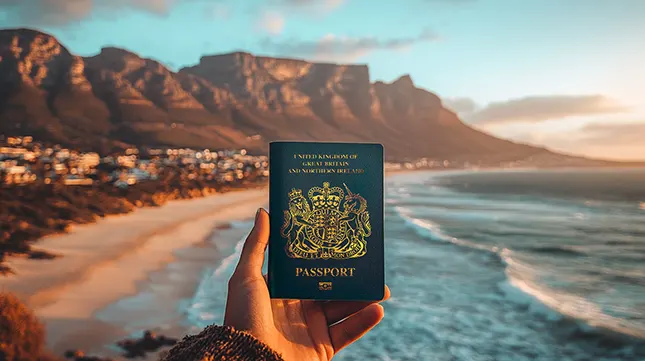
Securing Permanent Residency in South Africa.
If you are ready to make South Africa your long-term home, the next step is to apply for permanent residency.
However, you need to factor in timings because the process can be lengthy and requires thorough preparation.
There are several routes to obtaining residency, including:
- Family Member Residency – For those with biological relatives who are South African citizens.
- Spousal or Life Partner Residency – For individuals married to a South African citizen.
- Five-Year Work Permit Residency – Available to those who have worked continuously in South Africa for five years.
- Critical Skills Residency – For professionals with specialized skills needed in the country.
- Business Visa Residency – For entrepreneurs contributing to the South African economy.
- Retirement Residency – For retirees looking to settle in South Africa.
To apply, you will need key documents such as passport photos, a valid passport, a medical certificate, a police clearance certificate, and, if applicable, a marriage certificate.
Ensuring all documents are in order before applying will help streamline the process.
Again, for updated visa requirements and application procedures, check the Department of Home Affairs website.
Becoming a South African Citizen
Permanent residency is a major milestone, but full South African citizenship offers additional rights, including the ability to vote.
There are several routes to obtaining citizenship.
To qualify, you must have lived in the country for five continuous years as a permanent resident.
The requirement for spouses of South African citizens is just two years.
Additional criteria for citizenship include:
- Demonstrating good character.
- Proficiency in one of South Africa’s official languages.
- Understanding the responsibilities of South African citizenship.
While the process requires commitment, it is relatively straightforward compared to other countries like Australia or the USA.
Wise has produced an informative guide about how foreigners apply for citizenship, including a how-to guide, costs, and other useful information.
Bringing Pets to South Africa: What You Need to Know

Bringing Pets to South Africa What You Need to Know.
If you plan to move to South Africa with your furry friend, you will be happy to know that pet importation is possible, provided you follow the country’s strict regulations.
Travelling with many pets can be incredibly stressful. Preparing well in advance will help avoid delays or complications when bringing your pet into the country.
Pet Import Requirements
To bring your pet to South Africa, you must meet the following criteria:
- Microchip Identification – Your pet must be implanted with an ISO 11784/11785 compliant microchip for identification.
- Health Certificate – A veterinary certificate from a registered vet confirming that your pet is healthy and fit for travel.
- Rabies Vaccination—Proof of current rabies vaccination is required. The vaccine must be administered at least 30 days before travel but not older than a year.
- Import Permit – Dogs and cats must have a veterinary import permit issued by the South African authorities.
Failure to comply with these regulations can result in your pet being quarantined upon arrival, at great expense.
For detailed guidelines on importing pets into South Africa, visit:
🔗 Pets2Fly
🔗 South African Department of Agriculture
With the right preparation, you can ensure a smooth relocation and happy reunion for both you and your pet.
Driving in South Africa: What Expats Need to Know
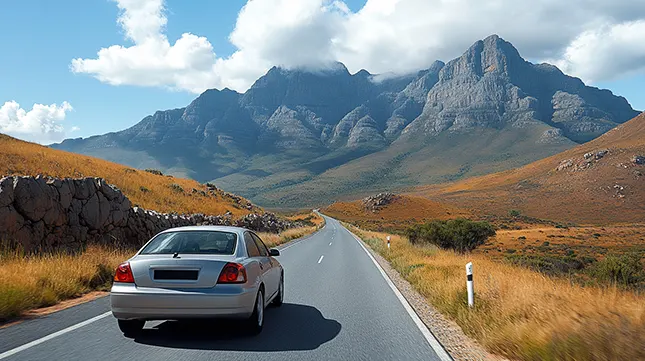
Driving in South Africa What Expats Need to Know.
If you are moving to South Africa, driving a car will feel familiar, at least in some ways! Like in the UK, South Africans drive on the left-hand side of the road, which is a big relief for many British expats.
However, there are some key differences to be aware of before hitting the road.
Adapting to Driving Conditions
- Speed Limits – South Africa’s roads use kilometres per hour (km/h) instead of miles per hour. Speed limits are:
- 60 km/h (37 mph) in urban areas
- 100 km/h (62 mph) in rural areas
- 120 km/h (75 mph) on highways
- Road Quality – While major highways are well-maintained, some rural roads can be rough, with potholes or dirt tracks.
- Long Distances—Some regions have vast open landscapes with long stretches of road and limited services. For safety, always carry water, fuel, and a fully charged phone.
- Traffic Laws – Seatbelts are mandatory, and children under 12 must sit in the rear seats with appropriate restraints.
Driving License Requirements
To legally drive in South Africa as an expat, you will need:
- A valid UK driving license.
- An International Driver’s Permit (IDP) – This is required alongside your UK license and must be obtained before you leave the UK.
Check with your local South African transport authority for up-to-date driving regulations before taking to the roads.
🔗 South African National Roads Agency –
🔗 South African Driving License Authority –
While it takes some time to adjust, driving in South Africa is manageable for most expats, particularly with proper preparation.
Importing Your Car to South Africa: Is It Worth It?
If you are considering bringing your car with you when moving to South Africa, be prepared for a complex process.
While it is possible, many expats choose to sell their car in the UK and buy a vehicle locally instead.
Requirements for Importing a Car:
To import your vehicle, you must follow these steps:
- Obtain an Authority Letter – This is issued by the South African Bureau of Standards (SABS).
- Complete the Import Application – Fill out the ‘Application for Importing a Second-Hand or Used Vehicle’ (Form IE462).
🔗 Download the form here: https://www.sabs.co.za/ - Provide Supporting Documents – You must submit:
- Your South African permanent residence certificate
- A valid foreign passport
- Your foreign car registration certificate
- Pay Import Duties & Taxes – The South African Revenue Service (SARS) will calculate customs duties and VAT based on your vehicle’s value.
🔗 More information visit AVO. - Mandatory Ownership Period – Once imported, you cannot sell your car in South Africa for at least 24 months.
In short, while some expats successfully bring their vehicles along with them, the process is costly and time-consuming. Many find it cheaper and more convenient to buy a car locally instead.
If you decide to import, ensure that you understand the full costs and legal requirements before proceeding.
Weather and Climate in South Africa – What to Expect

Weather and Climate in South Africa – What to Expect.
A massive plus for expats moving to South Africa is its fantastic climate, a welcome change from the UK’s grey skies.
However, a key difference is that the seasons are reversed compared to the Northern Hemisphere.
Winter (June to August) – Generally dry and mild, although mountainous regions see snow and the Western Cape experiences heavy rainfall.
Summer (December to February) – Hot and often extreme, with temperatures regularly exceeding 30°C and even reaching 40°C in some regions.
The warm climate makes outdoor activities like hiking, beach trips, and safaris enjoyable year-round. Remember, sun protection is crucial, as the UV index can be high, particularly in summer.
For those preferring milder conditions, the coastal areas offer pleasant sea breezes, while Johannesburg has a dry, temperate climate with sunny days even in winter.
Understanding South Africa’s Population and Major Cities
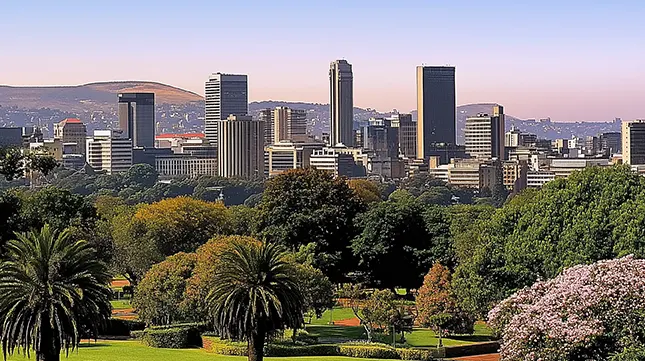
Understanding South Africa’s Population and Major Cities
As of the 2022 South African census, the country’s population stands at 62,027,503, marking a significant increase over the past decade.
This growth positions South Africa as the 24th most populous nation globally.Wikipedia
Major Cities and Their Roles
Although Johannesburg is the largest city, with a population of approximately 4.5 million, it is not a capital city.
Uniquely, South Africa has three capital cities, each serving distinct governmental functions:
- Pretoria: As the administrative capital, Pretoria houses the executive branch of the government. Renowned for its academic and research institutions, the city has a population of around 741,651 residents.
- Bloemfontein: The judicial capital, Bloemfontein, is home to the Supreme Court of Appeal. The city has approximately 520,000 residents.
- Cape Town: Functioning as the legislative capital, Cape Town hosts the Parliament of South Africa. The city itself has about 433,688 residents, with the greater metropolitan area encompassing over 4.9 million people.
Currency Exchange: GBP to ZAR
As of March 2025, the exchange rate is approximately 1 British Pound (GBP) equals 23.61 South African Rand (ZAR). (Rates as per Coinmill)
It is important to note that currency values can fluctuate due to various economic factors. For the most current rates, consider checking reputable financial websites or currency converters before making any transactions.
Crime Rates in South Africa: An Overview
While South Africa is celebrated for its friendly culture and diverse landscapes, many people live in abject poverty, it is crucial to be aware of the country’s crime statistics to ensure personal safety.
Current Crime Statistics
According to statista 2023–24, reported contact crimes (“crimes against the person”) increased by 2.1% compared to the previous year.
- Attempted Murder: Saw a 12.3% year-on-year increase.
- Murder Rate: Averages 77 people murdered per day.
- Assault with Intent to Cause Grievous Bodily Harm: Reports average 160 cases per day.
These statistics underscore the importance of staying informed and vigilant.
Safety Recommendations
When compared with the size of the population, a small number of people commit the most serious violent crimes, particularly murder, however you must stay vigilant.
- Stay Informed: Regularly check local news and updates from reputable sources to be aware of any crime trends or hotspots.
- Exercise Caution, particularly in central business districts of major cities after dark, as these areas may be more prone to violent crime.
- Avoid High-Risk Areas: Be cautious in regions known for higher crime rates and avoid unnecessary travel to such areas, especially during late hours.
By taking these precautions, you can significantly enhance your safety while living in or visiting South Africa.
Giving Birth in South Africa

Giving Birth in South Africa
If you are planning to have a child in South Africa, you will need to understand the healthcare system and birth registration process.
While public healthcare is available, it is underfunded, and overstretched, which is why many expats opt for private healthcare insurance.
Healthcare & Maternity Costs
- It is advisable to arrange private health insurance before leaving the UK to ensure immediate coverage upon arrival.
- Without medical aid, giving birth in a private hospital costs approximately R45,000+ (£1,900), though this can be higher depending on the facility and services required.
Birth Registration & Citizenship
If one or both parents are South African citizens or permanent residents, the child will automatically be granted South African citizenship.
To register the birth, parents must visit the Department of Home Affairs and provide:
- A birth certificate application form (available at Home Affairs offices)
- Parents’ identity documents (passports or SA IDs)
- Marriage certificate (if applicable)
For up-to-date information on birth registration, visit:
🔗 South African Department of Home Affairs – https://www.dha.gov.za/
Getting Married in South Africa

Getting Married in South Africa.
Many believe that marrying a South African citizen automatically grants residency, but the process is more complex.
While marriage can help your visa application, you must wait at least two years to apply for South African citizenship.
Marriage Registration Process
To get married in South Africa, both partners must:
- Visit a Home Affairs Office in person to schedule an immigration interview.
- Provide all necessary legal documents to verify eligibility.
- Once the interview is completed, an Immigration Report is submitted to the Marriage Section for approval.
Documents Required for Foreigners
If you are a non-South African citizen, you will need to submit:
✔ A copy of the front page of your passport
✔ A copy of your South African visa page
✔ Three passport-sized ID photos
✔ Divorce decree or death certificate (if previously married)
✔ Letter of Non-Impediment (a certificate proving you are free to marry, issued by your home country)
For guidelines on getting married in South Africa, visit the Getting Married in South Africa website.
Registering a Death in South Africa
Losing a loved one while living abroad can be overwhelming.
In South Africa, all deaths must be officially registered with local authorities, and UK citizens can also report the death to British authorities if required.
Steps to Register a Death in South Africa
- Report the death to the Department of Home Affairs.
- Obtain a Death Certificate from the authorities (this will be required for legal and financial matters).
- If you wish to repatriate the body to another country, you must arrange transportation through a registered funeral director.
Reporting a Death to UK Authorities
For British citizens, deaths can also be reported to the UK Foreign, Commonwealth & Development Office (FCDO).
The UK government’s Tell Us Once service can assist with notifying relevant institutions.
🔗 Tell Us Once (UK Government Service)
🔗 UK Government Foreign Travel Advice – South Africa
Whether you are having a baby, getting married, or dealing with the loss of a loved one, following the correct legal procedures will ensure a smoother, less stressful experience.
Working in South Africa: Employment Opportunities and Visa Requirements

Working in South Africa Employment Opportunities and Visa Requirements.
South Africa offers a diverse range of employment opportunities across various sectors.
However, securing a job largely depends on the type of visa or permit you possess.
Understanding the country’s economic landscape and visa requirements is crucial for a successful transition.
Economic Landscape and Employment Sectors
Historically, South Africa’s economy was anchored in agriculture and mining. Over the years, it has diversified, with key sectors now including:
- Industry: Mining and automobile manufacturing remain significant, contributing substantially to exports.
- Agriculture: Continues to be a vital sector, providing numerous employment opportunities.
- Services: Tourism, finance, and e-commerce are burgeoning fields, reflecting the country’s shift towards a more service-oriented economy.
This diversification indicates a growing demand for skilled professionals, particularly in technology, finance, and e-commerce.
Prospective expatriates with expertise in these areas may find many opportunities.
Check out Jobfinders25 for a list of the top ten in-demand jobs in the country in 2025.
Visa and Work Permit Categories
To work legally in South Africa, obtaining the appropriate visa is essential. The main categories include:
- General Work Visa: This visa requires a formal job offer from a South African employer. The employer must demonstrate that no qualified South African citizen is available for the position.
- Critical Skills Work Visa: Designed for individuals possessing skills deemed critical by the South African government. Applicants do not need a job offer before arrival but must secure employment within 12 months.
- Intra-Company Transfer Work Visa: Applicable to employees of multinational companies transferred to a South African branch, subsidiary, or affiliate. Applicants must have been employed by the foreign entity for at least six months prior to the transfer.
It is advisable to secure employment before relocating.
Websites like PNet and CareerJunction list current job openings and can help assess the demand for your skills.
Taxation in South Africa
South Africa employs a progressive personal income tax system similar to the UK but with extra bands.
Rates for the 2024/2025 tax year as follows:
- Up to R237,100: 18%
- R237,101 – R370,500: R42,678 + 26% of income above R237,100
- R370,501 – R512,800: R77,362 + 31% of income above R370,500
- R512,801 – R673,000: R121,475 + 36% of income above R512,800
- R673,001 – R857,900: R179,147 + 39% of income above R673,000
- R857,901 – R1,817,000: R251,258 + 41% of income above R857,900
- Above R1,817,001: R644,489 + 45% of income above R1,817,000
Non-residents are taxed solely on income sourced within South Africa.
Additionally, the Value-Added Tax (VAT) rate is 15%, slightly lower than the UK’s 20%.
Pension Considerations

Pension Considerations.
If you have accumulated a state pension in the UK, inform the relevant authorities about your relocation.
You may still be eligible to claim your UK pension if you have made sufficient national insurance contributions.
South Africa’s pension system comprises three pillars:
- Non-contributory grants: Provided by the South African Social Security Agency (SASSA) to qualifying pensioners.
- Employer and company pensions: Insurance-based funds offered by employers.
- Private pensions: Individual retirement savings and insurance arrangements.
While the official retirement age is sixty-five, there is no legally mandated retirement age.
Employers may set their own retirement policies based on specific professions.
Social Security System
In South Africa, social security benefits are primarily managed by SASSA – The South African Social Security Agency, a government agency that administers social grants to eligible citizens.
The benefits you can claim are directly linked to your contributions, with one credit earned for every six days worked.
Expatriates can access social security benefits only if they become South African citizens or permanent residents.
Types of benefits that can be claimed for include:
- Child Support
- Old Age Pension
- Care Grants
- Disability Grants
For more detailed information about categories, grants, and how to apply for these benefits, visit the SASSA website.
Buying Property in South Africa

Buying Property in South Africa.
Purchasing property in South Africa remains relatively affordable compared to many Western countries.
With abundant land available, homes in South Africa are often single-story structures, situated on spacious plots with generous gardens.
Even those with moderate incomes can enjoy features like private swimming pools, which are considered more accessible than in many other countries.
Whether you are in the market for a modern city apartment or a suburban family home, purchasing property in South Africa is a relatively straightforward process, provided you have a sufficient deposit in place.
Expats face no legal restrictions on buying property, but it is important to familiarise yourself with the local real estate system and understand the associated costs and procedures, as they may differ from those in your home country.
The average house price has surpassed R1.6 million (approximately £68,000) according to rei News.
There are provincial variations with regard to property prices:
- Western Cape (Cape Town): The most expensive region, with average property prices around R1.9 million.
- Eastern Cape and Northwest: Offer more affordable options, with prices significantly lower than the national average.
Overall, you can expect to get so much more for your money when you invest in South Africa, even when purchasing a property close to the sea.
Renting Property in South Africa
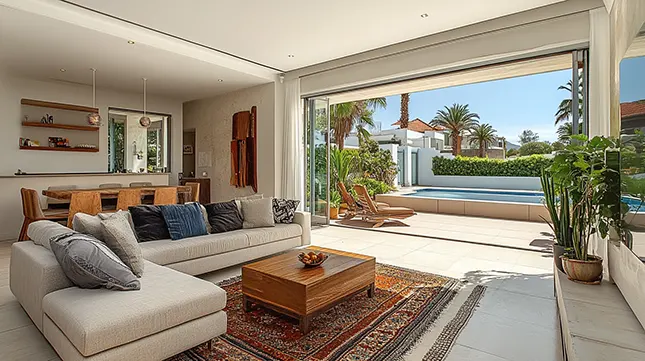
Renting Property in South Africa.
As most new arrivals opt to rent a home initially, it is a good idea to familiarise yourself with this market too.
The rental market has become increasingly active, with average rents reaching new highs, however UK expats will still be surprised at how cheap renting a home can be.
Homes are often furnished but unfurnished options are available.
Average Rental Costs:
- National Average: The average rent paid in South Africa has hit record highs, reaching R9,051(£214) per month.
- Western Cape: Is the most expensive province for rentals, with average rents around R10,300 (£437)
- Eastern Cape and Northwest: More affordable, with a significant portion of rentals priced between R2,500 (£105) and R7,500 (£317) per month.
For essential tips and advice about renting a home in South Africa visit the Expat Exchange.
Top Real Estate Agent in South Africa

Top Real Estate Agent in South Africa.
When the time comes, you must ensure that you deal with a well-established real estate agent.
It is wide to visit some of the popular real estate agent websites to see exactly what you might be able to afford for your budget, whether you intend to rent or buy:
Pam Golding Properties: Established in 1976, Pam Golding Properties is one of South Africa’s most prestigious real estate companies.
It offers a wide range of residential and commercial properties across the country.
Seeff Property Group: Founded in 1964, Seeff is a prominent real estate agency in South Africa.
It provides comprehensive property services, including sales, rentals, and property management.
RE/MAX of Southern Africa: Part of the global RE/MAX network, RE/MAX of Southern Africa offers extensive property listings and services, catering to both residential and commercial markets.
These agencies have established strong reputations and have plenty of experience in the South African real estate market.
They provide a wide array of property services to meet diverse client needs.
Cultural Differences

Cultural Differences.
While English is widely spoken in both countries, South Africa’s cultural landscape is richly diverse, influenced by a blend of African, European, and Asian traditions.
This diversity manifests in various aspects of daily life, from cuisine and music to social norms and celebrations.
Understanding and embracing this multicultural environment can enrich your experience in South Africa.
The culture is very much family-oriented, emphasising enjoying time off from work, allowing for leisure activities such as outdoor adventures, social gatherings, and family time.
It is common to see families embracing the beach life and rustling up a barbeque (or Braai) after work, either on the sand or in the backyard.
There is a definite air of relaxation and a much better work/home life balance in the country compared to the UK, which fosters a holistic lifestyle many expatriates find appealing.
Work-Life Balance
While South Africans strongly emphasise balancing work commitments with personal time, do not be fooled into thinking they do not work hard.
On the contrary, a good work ethic is important to them.
Having faced economic and social challenges, including past political struggles, fluctuating economies, and a highly competitive job market.
Additionally, with eleven official languages and a multicultural society, South African workplaces emphasise teamwork, collaboration, and adaptability.
These factors have created a workforce that is resilient and hardworking and now flourishing in a competitive and diverse business environment.
Language Barriers
South Africa is a multilingual nation with eleven official languages:
- Sepedi (Sesotho sa Leboa)
- Sesotho
- Setswana
- siSwati
- Tshivenda
- Xitsonga
- Afrikaans
- English
- isiNdebele
- isiXhosa
- isiZulu
While English is the first language for approximately 9.6% of the population, it serves as the lingua franca, widely used in business, education, and government.
Most South Africans are multilingual, often fluent in English alongside other Indigenous languages.
This linguistic diversity enriches the cultural fabric of the nation.
Embracing the opportunity to learn local languages can enhance your integration and appreciation of South African culture.
Numerous institutions and local community centres offer language courses for those interested in expanding their linguistic skills.
Cost of Living in South Africa
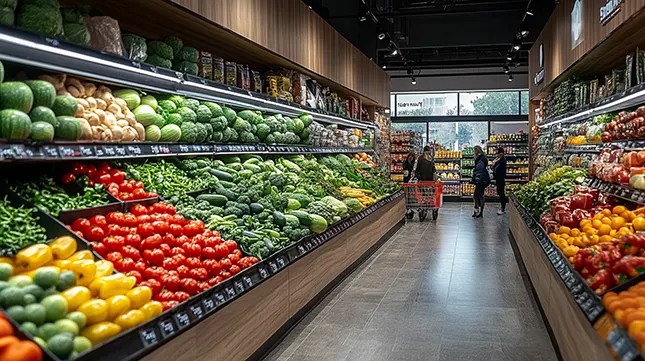
Cost of Living in South Africa.
One of the significant advantages of relocating to South Africa is the relatively lower cost of living compared to the UK.
Here is a comparative overview:
General Affordability:
- The overall cost of living in South Africa is approximately 97% lower or more in some instances, than in the United Kingdom.
Housing:
- Rent prices in the UK are about 167% higher than in South Africa.
Dining Out:
- Restaurant prices in the UK are roughly 121% higher than in South Africa.
Groceries:
- Grocery prices in the UK are about 99% higher than in South Africa.
Transportation:
- Transportation costs in the UK are approximately 74% higher than in South Africa.
Utilities:
- Basic utilities, including electricity, heating, and water, are 178% higher in South Africa.
Clothing and Footwear:
- Clothing and footwear are also less expensive in South Africa, offering quality options at competitive prices.
NOTE: All statistics taken from the cost-of-living website Numbeo
It is important to point out that while overall South Africa’s cost of living is very much lower when compared directly to the UK, salaries are also lower.
But, even with the salary differences, you will find that your outgoings will be much more affordable than the UK.
Healthcare in South Africa

Healthcare in South Africa.
Unlike many Western countries, where public services are generally reliable, South Africa presents a stark contrast between public and private options.
Understanding these differences will help you make informed decisions about your family’s well-being and future.
Private Healthcare – High Standards but High Costs
South Africa boasts a world-class private healthcare system, often ranking among the best globally.
Private hospitals are well-equipped, with highly trained medical professionals providing top-tier care.
Many expats choose private healthcare over the public system due to shorter wait times and superior facilities.
However, the cost of private healthcare can be significant. For example, maternity care in a private hospital starts at approximately R45,000 (£1,800), and a routine GP consultation can range from R500–R1,200 (£20–£50) per visit.
Specialist consultations and surgeries can be even more expensive.
To avoid financial strain, securing comprehensive health insurance before arriving in South Africa is essential.
Many international insurers offer expat-focused policies, covering everything from general consultations to emergency surgeries and repatriation services.
Some leading health insurance providers include:
Without medical insurance, private healthcare costs can quickly add up.
It is best to compare providers and choose a plan that covers hospitalisation, chronic conditions, and emergency care.
Public Healthcare – Limited but Accessible
South Africa’s public healthcare system provides medical services to most of the population at a low cost or for free, depending on income levels.
However, it is often overcrowded, underfunded, and faces resource shortages, leading to long wait times and inconsistent service quality.
While some public hospitals, such as Groote Schuur Hospital in Cape Town, have excellent specialists and research facilities, they are generally not the first choice for expatriates due to their limitations.
Expats tend to rely on private healthcare for routine and emergency services, while the public system remains a backup option.
If you plan to use public healthcare, it is essential to register at a local clinic upon arrival and understand which hospitals have the best reputation in your area.
Education System – A Diverse Range of Options

Education System – A Diverse Range of Options.
Education in South Africa follows a compulsory schooling system from ages 7 to 18, although most children start earlier at ages 5 or 6.
The academic year runs from mid-January to early December, differing from the mid-year school start in the UK.
There are three primary education options available to expatriates:
- Public Schools – Free or low-cost, but vary significantly in quality.
- Private Schools – Higher quality but come with significant tuition fees.
- International Schools – Ideal for expats who want a globally recognised curriculum.
Private Schools – A Preferred Choice for Expats
Most expatriates opt for private education, as it offers smaller class sizes, better facilities, and a wider range of extracurricular activities.
Private schools also tend to follow British, American, or International Baccalaureate (IB) curricula, making them an attractive option for families moving from abroad.
However, these benefits come at a cost. Some of the top private schools in South Africa and their annual fees (2025 figures) include:
- Hilton College – R397,660 (£16,500)
- Michaelhouse – R368,000 (£15,300)
- Kearsney College – R350,130 (£14,500)
- St John’s College – R352,612 (£14,600)
- Roedean School – R360,087 (£14,900)
While these fees may seem high, they remain more affordable than private schools in the UK, where annual tuition fees often exceed £20,000 per year.
International Schools – A Seamless Transition for Expats
For those seeking an international curriculum, South Africa has several excellent international schools offering IGCSE, A-Level, and IB programs. Some of the most reputable international schools include:
- American International School of Johannesburg
- British International College
- International School of Cape Town
- Lycée Français Jules Verne (French curriculum)
International schools provide a smoother transition for expat children, ensuring continuity in education and qualifications recognised worldwide.
Getting Around – Public Transport in South Africa
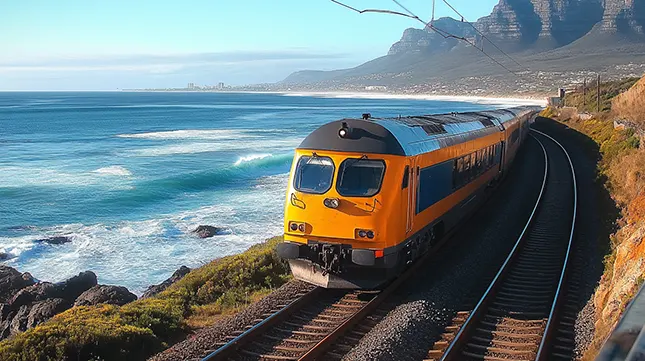
Getting Around – Public Transport in South Africa
South Africa has a well-developed transport network, making it easy to travel between cities and explore the country’s diverse landscapes.
With 15 regional airports, reliable coach services, and a scenic train network, there are multiple ways to get around.
Trains – Slow but Scenic
Train travel in South Africa is comfortable and scenic but not the fastest option.
First-class seating is highly recommended for a more secure and enjoyable experience, especially on long-distance routes.
For a luxury rail experience, the Rovos Rail and The Blue Train offer world-famous journeys through breathtaking landscapes.
Coaches – Affordable and Convenient
Long-distance coaches, such as Intercape and Greyhound, are budget-friendly and comfortable.
They feature air conditioning and onboard toilets.
Public Buses – Cheap City Travel
For city travel, buses are the most affordable option.
For example, in Cape Town, a ride from Adderley Street to the V&A Waterfront costs just R6.40 (around 30p GBP) outside peak hours. Fares vary depending on distance and route.
While public transport is available, many expats and locals prefer using rideshare services like Uber or Bolt for added convenience and safety.
Beaches – A Coastal Paradise

A Coastal Paradise.
South Africa boasts over 1,770 miles of coastline, featuring some of the most stunning beaches in the world. Whether you prefer untouched, remote shores or lively, surf-friendly spots, there is a beach for everyone.
Notably, 8 of South Africa’s beaches rank among Africa’s top 50.
Coffee Bay on the Eastern Cape stands out, which earns a perfect 10/10 rating for its scenic beauty, unspoiled waters, and peaceful atmosphere.
This area is ideal for a relaxing escape.
It offers spectacular walks, top-tier fishing spots, and charming local bars and restaurants.
Other top beach destinations include:
- Camps Bay Beach – A vibrant spot near Cape Town with white sand and mountain views.
- Clifton Beaches – Four picturesque beaches with crystal-clear waters and luxury surroundings.
- Umhlanga Rocks – A trendy KwaZulu-Natal destination, great for surfing and sunbathing.
For a full list of South Africa’s must-visit beaches, check out Lonely Planet’s guide.
Breathtaking Landscapes – Exploring South Africa’s Natural Beauty

Exploring South Africa’s Natural Beauty.
From rolling vineyards to rugged mountains and golden deserts, South Africa is home to some of the most spectacular landscapes in Africa.
Some must-see destinations include:
- Cederberg Mountains – Just two hours from Cape Town, these dramatic rock formations provide a peaceful escape into nature.
- Lisbon Falls – At 94 metres high, Mpumalanga’s tallest waterfalls offer a breathtaking sight along the Panorama Route.
- The Dolphin Coast – Located in KwaZulu-Natal, this scenic stretch is named after the large schools of dolphins that frequent its waters.
South Africa’s diverse terrain makes it an adventurer’s paradise, with endless opportunities for hiking, wildlife spotting, and road trips.
For even more incredible locations to visit, check out South Africa Tourism’s official guide.
Nearby Destinations – Where to Travel from South Africa
One of the benefits of living in South Africa is access to an exciting range of travel destinations, both within the country and beyond.
Domestic travel is highly popular, with many South Africans choosing to holiday in Durban, a vibrant coastal city known for its golden beaches, warm waters, and year-round sunshine. Other sought-after destinations include the Cape Winelands, the Drakensberg Mountains, and Kruger National Park.
For international getaways, South African citizens most frequently visit:
- The UK – A top choice for those with family ties or business interests.
- The USA & France – Popular for leisure and cultural experiences.
- Thailand – A favourite for affordable beach holidays and adventure travel.
Are you ready to move to South Africa from the UK?

If you plan to travel frequently, ensure your British passport is valid, or consider obtaining a South African passport through citizenship for easier access to regional and global destinations.
Moving abroad is stressful for all involved. That’s why White & Company are here to help your move to South Africa be smooth and stress-free.
Over the years, White & Company has positioned itself as the international removals firm of choice for removals worldwide.
Our experience is second to none. As members of BAR, FIDI and OMNI, White & Company have been relocating people to destinations worldwide for 145 years.
Our experienced teams located across the UK will pack and prepare your valuable, fragile and bulky furniture ready for export
We have branch depots located across the UK that can pack and prepare your valuable, fragile and bulky furniture ready for export.
To find out more about how we could get your dream move underway, don’t hesitate to give us a call today.
Alternatively, fill out a quick quote form or chat with our Bot and we’ll get in touch with you straight away.

Max is a seasoned writer and blogger in the real estate and home moving sectors, as well as a knowledgeable source of information for expatriates living and working abroad. His detailed insights have helped thousands of people move and live abroad with greater simplicity and ease.
Posted in: News
Leave a Comment (0) ↓


